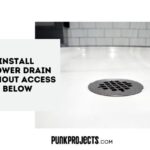Are you frustrated with hot water pressure low but cold fine? You’re not the only one! Many homes suffer from this. Don’t give up! We can help you understand why it’s happening. Get your hot water pressure back to normal!
Low hot water pressure is common. But don’t worry – we’ll show you how to get those hot showers back!
Let’s explore the causes and solutions. Say bye to lukewarm showers and hello to a hot, relaxing one!
Common Problems of Low Water Pressure in Showers
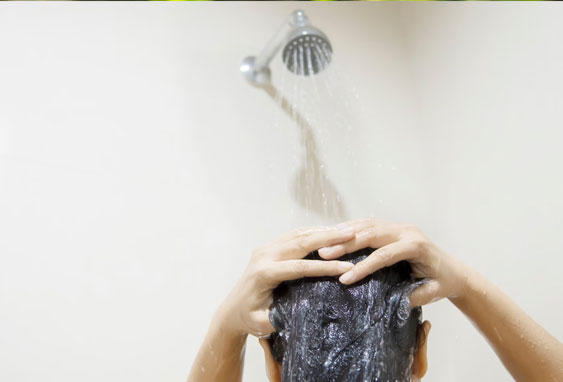
Low water pressure in the shower is a common issue many homeowners face. It can be caused by a lot of things. Here are some potential causes and tips to fix them:
- Hard water can lead to limescale and sediment build-up, restricting water flow. Clean the showerhead with vinegar or a specialized cleaning solution. If it doesn’t work, flush or descale the plumbing system.
- A restrictor valve may be installed to limit water flow. Remove or replace it with a higher flow valve.
- Rust and debris in iron pipes can cause clogs. Replace the old pipes or use a water filtration system.
- The main water piping system may have a problem. Check the water meter or contact the local water supplier.
- Low hot water pressure means there may be an issue with the hot water tank or heater. This can include a failing heating element, sediment buildup, or leaking pipes. Try DIY fixes, but if the issue persists, call a professional. They may suggest a combi boiler, shower pump, or electric shower to increase pressure.
Pro tip: Don’t ignore low water pressure; it can lead to costly and inconvenient plumbing problems. Do regular maintenance and get prompt repairs.
Understanding the signs of low water pressure
Have you noticed that your hot water pressure is lower than the cold water pressure at home? If so, there may be issues with your hot water system. Here are some causes of low hot water pressure:
- Clogged water system: Minerals and debris can pile up in water supply lines and reduce hot water flow.
- Hot water heater problems: An old or faulty hot water heater can affect hot water pressure.
- Hot water pipes: Corrosion or damage to hot water pipes can lead to low hot water pressure.
- Shower head clogs: Clogs in shower heads can stop hot water flow.
- Flow rate settings: If the hot water flow rate is too low, you may experience low hot water pressure.
If you’re losing hot water or your hot water faucets don’t give as much hot water, it’s best to take a closer look. To increase shower water pressure, adjust the flow rate setting or clean the shower head. If that doesn’t work, contact a professional plumber for an inspection.
Remember to do regular maintenance of your hot water system to avoid low hot water pressure. Schedule an annual inspection with a professional plumber to keep your hot water running smoothly.
How to Test Your Water Pressure
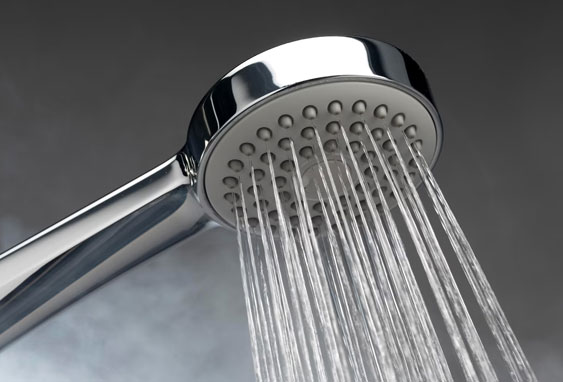
Tips and tricks here to figure out if water pressure is low. Also, how to troubleshoot the problem.
Tools required for testing
If you have low hot water pressure but normal cold water pressure, it’s time to test your water pressure! You’ll need some tools from a hardware store or online. Testing your water pressure can help you find the problem without having to call in a professional. Here are the necessary tools:
- Pressure Gauge – This device measures water pressure in PSI (pounds per square inch). It will tell you if your water pressure falls within the normal range (40-80 PSI).
- Teflon Tape – This helps keep connections from leaking.
- Pipe Wrench/Pliers – You’ll need these to open/close water supply valves.
- Cloth – This can be handy to keep tools from being misplaced.
Step by Step to Test Water Pressure
To test your water pressure, follow these steps:
- Find the main water supply valve near your water meter and turn it off.
- Connect the pressure gauge to the outdoor spigot and turn it on.
- Read the PSI on the gauge. Low pressure is below 40 PSI and high pressure is above 80 PSI. High pressure can damage hot water lines and the water heater tank.
- Check the pressure reducing valve near the main water supply valve and adjust it if needed.
- If the pressure is still low, clogged pipes or mineral deposits in hot water lines may be to blame. Get a professional plumbing service to inspect it.
Testing your water pressure is a great way to maintain hot water systems and water heaters. If the problem persists, don’t hesitate to call a professional. Wear protective gear like goggles, gloves, and earplugs when working with plumbing tools to avoid accidents.
Causes of Low Water Pressure in the Shower
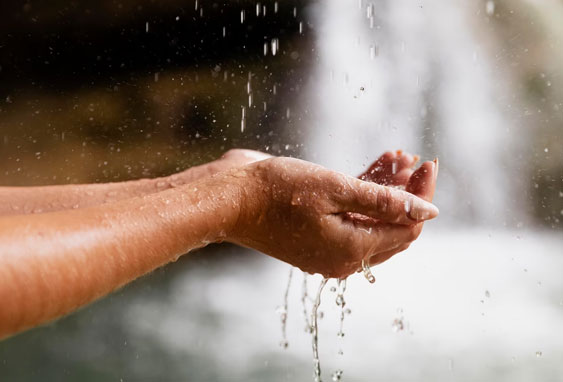
Low water pressure in the shower is a major pain. It’s worse when hot water pressure is lower than cold water. This makes showering less enjoyable and affects your daily routine – washing dishes, laundry and cleaning the house become difficult.
Let’s look into why there’s low water pressure in the shower and how to fix it.
1. Blocked Showerhead
Mineral buildup is one of the main culprits behind a blocked showerhead. This happens when hard water leaves behind mineral deposits on the inside of your showerhead over time.
Rust is another issue that can lead to blockages in your showerhead, especially if you have an older system with metal pipes that are beginning to corrode. Additionally, debris such as hair and soap scum can accumulate in the small openings of your showerhead over time and cause low water pressure.
2. Corroded Pipes
Corroded pipes can be a major cause of low water pressure in the shower. Over time, metal pipes can corrode due to exposure to moisture, minerals, and chemicals.
This corrosion leads to buildup inside the pipes, which can restrict the flow of water and reduce the pressure at your showerhead. If you notice that your shower is not delivering enough water pressure, then it’s possible that corroded pipes are to blame.
There are several factors that contribute to pipe corrosion. One common culprit is hard water, which contains high levels of calcium and magnesium.
These minerals react with metal surfaces and produce a buildup called scale or limescale.
Other factors include exposure to acidic substances like cleaners or chemicals from construction materials used in plumbing systems.
3. Plumbing Leaks
Leaks can occur anywhere in your home’s plumbing system, and they can cause serious damage if left unchecked.
Plumbing leaks can reduce the amount of water that reaches your showerhead, making it difficult to get enough pressure for a satisfying shower experience.
It’s important to take action as soon as you notice any signs of low water pressure in your shower. If left unaddressed, this problem could lead to more serious issues down the line, such as mold growth or even structural damage to your home.
If you suspect that plumbing leaks are causing low water pressure in your shower, it’s important to contact a licensed plumber right away.
4. Old plumbing system
An old plumbing system can cause low water pressure in several ways. Over time, pipes become corroded and rusted, which reduces their diameter and restricts water flow. Also, sediment buildup within the pipes can hinder water flow and reduce the amount of pressure that reaches your showerhead. Consequently, this results in weak streams of water during showers.
If your home has an old plumbing system and you want to improve your shower’s water pressure, it may be time to replace your pipes with new ones.
5. Build-up of limescale and sediment in the showerhead
Low hot water pressure in the shower can be annoying. It may be that the cold water pressure is fine but the hot water pressure is low. This could be caused by limescale and sediment buildup in the showerhead. Limescale is a hard, off-white substance formed when hard water is heated. It can clog up showerhead nozzles and reduce water pressure. Sediment can also block showerheads, leading to reduced pressure.
How to Fix – Increasing Shower Water Pressure
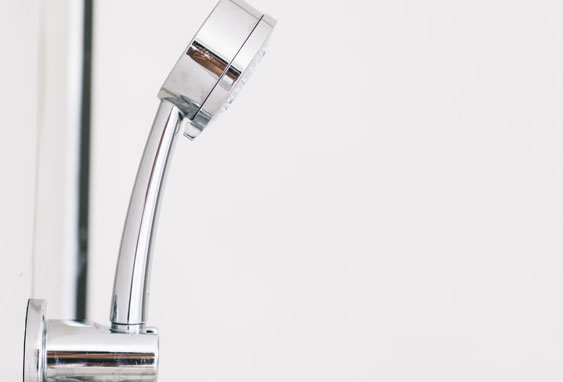
Are you done with your poor shower experience? Is your hot water pressure low but the cold water pressure’s ok? You’re not alone! Lots of homeowners have this issue. But don’t worry – there are solutions!
1. Check for leaks
The hot water pressure may be low, however the cold water pressure is still good. This could mean there’s a problem with the shower. It’s essential to look for any leaks to identify and fix the cause.
Here are some steps to improve hot water pressure and detect leaks:
- Check for visible leaks or drips in taps, pipes, showerhead, etc.
- Inspect the shower hose to see if any cuts or cracks are causing water loss
- Examine the showerhead for mineral buildup or clogs
- Test the water pressure of the whole house to see if it’s domain-specific or widespread
- Change damaged or worn-out parts, like washers, o-rings, etc.
- If the issue lasts or is too complex, consult with a professional plumber
Leak detection and repairs can help reduce water wastage, improve hot water pressure and save energy and money. Pro tip: Regularly inspect and maintain shower components to catch any issues before they become severe. If you live in an old house or have hard water, it’s advisable to check regularly.
2. Cleaning showerhead sediment
Experiencing low hot water pressure, but not cold? It’s possible your showerhead is clogged with sediment. This can come from minerals and other debris in your water supply. Cleaning your showerhead can help water pressure and stop damage. Here’s how:
- 1. Remove the showerhead from the pipe. Use pliers if needed, but be gentle.
- 2. Soak the showerhead in a bowl of white vinegar for at least 30 minutes. The vinegar will dissolve sediment and disinfect.
- 3. Rinse and scrub the surface with a soft-bristled brush to take away residue. Rinse all traces of vinegar.
- 4. Put the showerhead back on and test the water pressure. You should see an improvement in the hot water pressure.
Clean your showerhead often to stop sediment buildup. If you have hard water, clean more often. Install a water softener to reduce mineral buildup in plumbing.
Pro tip: To not damage your showerhead or plumbing, use a mix of water and vinegar, not just vinegar. Use a special showerhead cleaner for hard water buildup.
3. Ensure stop tap is open fully
When it comes to a refreshing shower, there’s nothing more annoying than low water pressure. It makes bathing a chore instead of relaxing.
A usual cause of this is the stop tap not open fully. Let’s look at why this is important:
- The stop tap controls the flow of water into your home, and if it’s not open all the way, water pressure can be affected.
- It could’ve been switched off partially while doing house chores. So, it’s essential to check.
- The valve washer may have worn out, which leads to water leaking, causing low pressure.
- The tap may be hard to reach, like under the sidewalk, so it’s often forgotten.
These are reasons why the stop tap needs to be open fully. If water pressure is still low, professional help should be sought.
A tip: Clean your showerhead regularly, as limescale can clog it, reducing water pressure. A descaling solution can fix this.
Remember: Check that the stop tap is open fully – this can often solve the problem and you can enjoy a high-pressure shower!
4. Installing a shower pump
Low hot water pressure in the shower? But cold water seems fine? Try installing a shower pump! It’s an electric device that boosts water pressure. Here are 3 reasons why you might need one:
- Distance from the water source: If your bathroom is far away, the pressure could be low. A shower pump can help.
- Low pressure from the mains: If there’s low pressure in your area, a pump can help boost it.
- Gravity-fed hot water system: If your hot water is supplied through a gravity-fed system, a shower pump is a must.
Installing a shower pump is not easy. Get a professional plumber to do it. They can make sure it works efficiently and pick the right type for your situation.
Pro tip: A shower pump increases water pressure. Get a pro to do the installation!
5. Professionals to call for common plumbing problems
Are you having low hot water pressure, but cold water is ok? This could be a common plumbing issue. It’s important to call a professional. Here are the people you can call:
- Licensed Plumbers – trained and experienced to help with plumbing issues, like low hot water pressure.
- Water Heater Installers – for any problems with your water heater. They can decide if it needs to be repaired or replaced.
- Shower Drain Cleaning Professionals – if pipes are blocked and causing low pressure. They will remove any blockages and restore the flow.
- Gas Line Installers – if you have a gas water heater and suspect a gas leak. It’s risky to do it yourself, so you should call an expert.
Remember, attempting to fix plumbing yourself can be dangerous and make the problem worse. It’s better to call a professional.
For prevention of future issues, schedule regular inspections with a licensed plumber.
FAQs: Hot Water Pressure Low But Cold Fine
Why is my hot water pressure low but my cold water pressure is fine?
The most common reason for this is a blockage in the hot water pipes or a malfunctioning hot water valve.
Can a water heater cause low hot water pressure?
Yes, a malfunctioning water heater can cause low hot water pressure. Sediment buildup and faulty heating elements are common culprits.
How can I check for blockages in my hot water pipes?
Turn off the water supply to your home and open all hot water faucets. If some have low pressure and others have normal pressure, you likely have a blockage in the pipes leading to the low pressure faucets.
Should I call a plumber for low hot water pressure?
Yes, it is best to call a professional plumber to diagnose and fix the issue. Attempting to fix it yourself can result in further damage or injury.
How often should I flush my water heater?
Flushing your water heater once a year is recommended to prevent sediment buildup and maintain optimal performance.
What are some other causes of low hot water pressure?
Other possible causes can include a malfunctioning pressure regulator, kinks or damage in the hot water pipes, or a problem with the hot water valve on your appliance.
I am a multi-talented designer and contractor with over 10 years of experience in the field. I have a passion for creating beautiful, innovative spaces that reflect my clients’ needs and styles. My skills include architectural design, interior design, space planning, project management and construction supervision.





